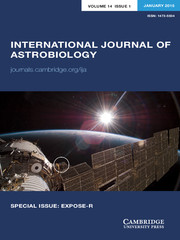Crossref Citations
This article has been cited by the following publications. This list is generated based on data provided by
Crossref.
Trimble, Virginia
Aschwanden, Markus J.
and
Hansen, Carl J.
2006.
Astrophysics in 2005.
Publications of the Astronomical Society of the Pacific,
Vol. 118,
Issue. 845,
p.
947.
Poole, Anthony M.
and
Willerslev, Eske
2007.
Can Identification of a Fourth Domain of Life Be Made from Sequence Data Alone, and Could It Be Done on Mars?.
Astrobiology,
Vol. 7,
Issue. 5,
p.
801.
O’Malley, Maureen A.
and
Dupré, John
2007.
Towards a philosophy of microbiology.
Studies in History and Philosophy of Science Part C: Studies in History and Philosophy of Biological and Biomedical Sciences,
Vol. 38,
Issue. 4,
p.
775.
Cleland, Carol E.
2007.
Epistemological issues in the study of microbial life: alternative terran biospheres?.
Studies in History and Philosophy of Science Part C: Studies in History and Philosophy of Biological and Biomedical Sciences,
Vol. 38,
Issue. 4,
p.
847.
Bedau, Mark A.
2007.
A Companion to the Philosophy of Biology.
p.
455.
O’Malley, Maureen A.
and
Dupré, John
2007.
Size doesn’t matter: towards a more inclusive philosophy of biology.
Biology & Philosophy,
Vol. 22,
Issue. 2,
p.
155.
Davies, Paul C.W.
Benner, Steven A.
Cleland, Carol E.
Lineweaver, Charles H.
McKay, Christopher P.
and
Wolfe-Simon, Felisa
2009.
Signatures of a Shadow Biosphere.
Astrobiology,
Vol. 9,
Issue. 2,
p.
241.
Wolfe-Simon, Felisa
Davies, Paul C.W.
and
Anbar, Ariel D.
2009.
Did nature also choose arsenic?.
International Journal of Astrobiology,
Vol. 8,
Issue. 2,
p.
69.
Pirajno, Franco
2009.
Hydrothermal Processes and Mineral Systems.
p.
1025.
Shapiro, Robert
and
Schulze-Makuch, Dirk
2009.
The Search for Alien Life in Our Solar System: Strategies and Priorities.
Astrobiology,
Vol. 9,
Issue. 4,
p.
335.
Morris, Simon Conway
2011.
Predicting what extra-terrestrials will be like: and preparing for the worst.
Philosophical Transactions of the Royal Society A: Mathematical, Physical and Engineering Sciences,
Vol. 369,
Issue. 1936,
p.
555.
Houtkooper, Joop M.
2011.
Glaciopanspermia: Seeding the terrestrial planets with life?.
Planetary and Space Science,
Vol. 59,
Issue. 10,
p.
1107.
Dominik, Martin
and
Zarnecki, John C.
2011.
The detection of extra-terrestrial life and the consequences for science and society.
Philosophical Transactions of the Royal Society A: Mathematical, Physical and Engineering Sciences,
Vol. 369,
Issue. 1936,
p.
499.
McKay, Christopher P.
2011.
The search for life in our Solar System and the implications for science and society.
Philosophical Transactions of the Royal Society A: Mathematical, Physical and Engineering Sciences,
Vol. 369,
Issue. 1936,
p.
594.
Rull, Valentí
2012.
Time, evolution and physical reductionism.
EMBO reports,
Vol. 13,
Issue. 3,
p.
181.
Hazen, Robert M.
2012.
Fundamentals of Geobiology.
p.
315.
Cleland, Carol E.
2012.
Life without definitions.
Synthese,
Vol. 185,
Issue. 1,
p.
125.
Beccia, Maria Rosa
Biver, Tarita
Pardini, Alberto
Spinelli, Jacopo
Secco, Fernando
Venturini, Marcella
Busto Vázquez, Natalia
Lopez Cornejo, Maria Pilar
Martin Herrera, Victoria Isabel
and
Prado Gotor, Rafael
2012.
The Fluorophore 4′,6‐Diamidino‐2‐phenylindole (DAPI) Induces DNA Folding in Long Double‐Stranded DNA.
Chemistry – An Asian Journal,
Vol. 7,
Issue. 8,
p.
1803.
Benner, Steven
and
Davies, Paul
2012.
Frontiers of Astrobiology.
p.
25.
Davies, P.C.W.
2012.
Footprints of alien technology.
Acta Astronautica,
Vol. 73,
Issue. ,
p.
250.


